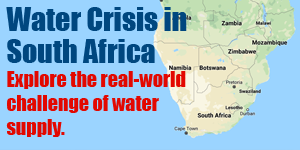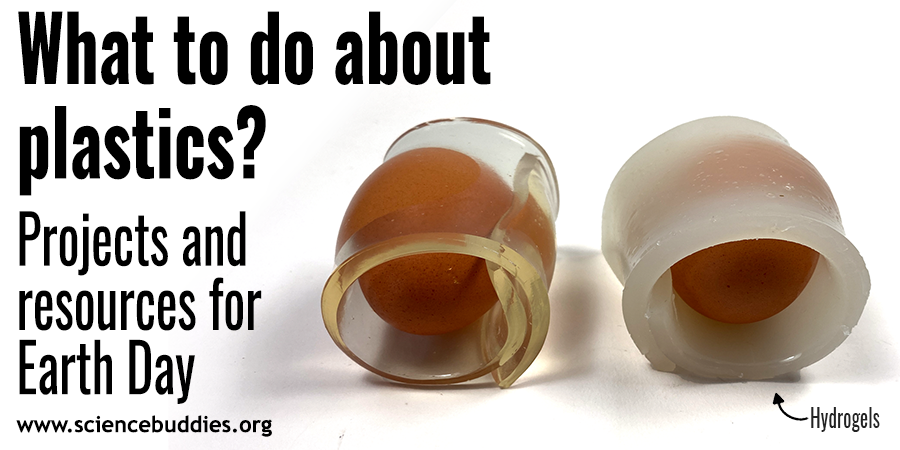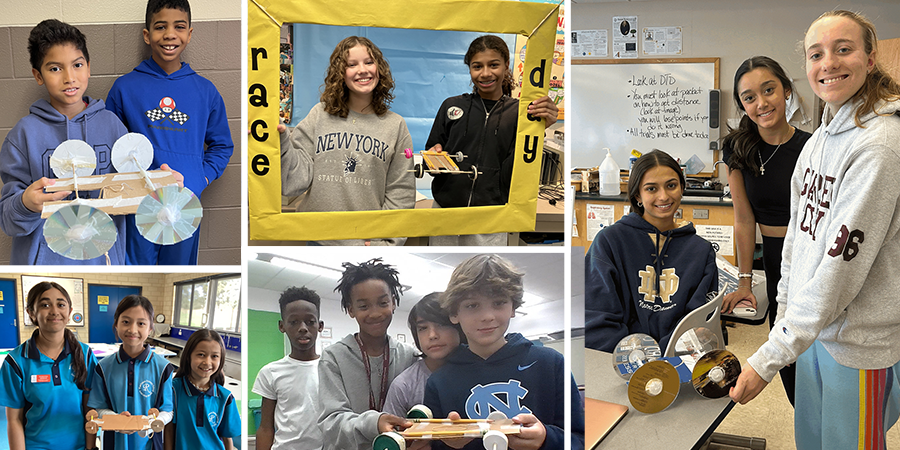Critical Water Shortage in South Africa
The outlook in South Africa is grim as a major city's water supply slowly runs out. Day Zero for Cape Town is approaching. In talking with students about the crisis, teachers can lead discussions about what has happened and ways in which science may be used to help with conservation efforts.
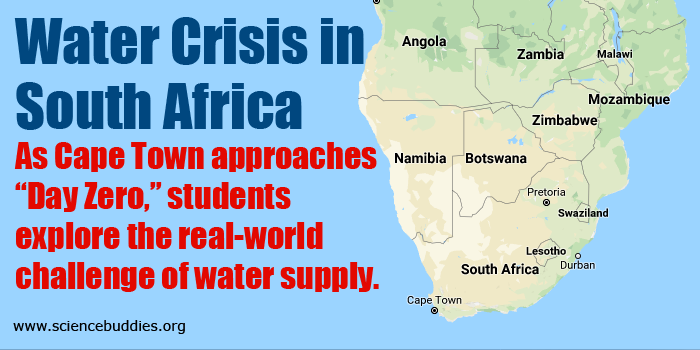
Water Crisis in South Africa: As Cape Town approaches "Day Zero," students explore the real-world challenge of water supply. www.sciencebuddies.org
Reports about the water crisis in South Africa read like something from dystopian science fiction, so much so that the day on which Cape Town will run out of water has been dubbed "Day Zero." And that day is coming soon, even sooner than scientists first projected. According to news reports, officials moved up the projection for Day Zero because, despite conservation efforts, Cape Town is running out of water even faster than expected. Right now, Day Zero is penciled in for April 12, 2018. That could still change, but whatever day ends up being Day Zero, it will be the day that a major city officially runs out of water.
Without a doubt, this is the stuff of science fiction novels, except it is happening to real people, in a real city. Cape Town's water crisis is partly a result of an extreme drought spanning several years, a large and growing population of more than four million, and changes in climate. That the city sits at the base of Africa between the Altantic and Indian Oceans and is running out of water is hard for many to understand. Water seems to be everywhere. Potable (drinkable) water, however, is almost gone, and the reservoirs are running dry. Cape Town officials have taken steps to encourage water conservation and limit water consumption. People are saving and reusing water.
And the city is running out of water even faster than anticipated.
How Much is 50 Litres?
Starting February 1, Cape Town residents will be limited to 50 litres of water per person. This graphic from the Defeat Day Zero campaign helps show what you can do with 50 litres.
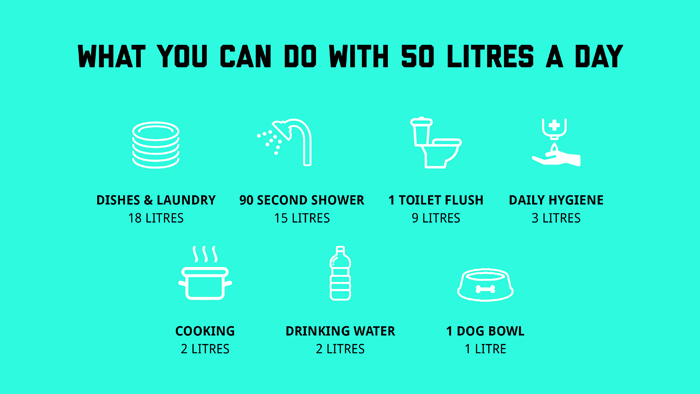
A simple infographic highlights how much water common tasks consume. The 7 tasks highlighted are: dishes and laundry (18 litres), a 90 second shower (15 litres), flushing a toilet (9 litres), washing hands for a day (3 litres), cooking (2 litres), drinking (2 litres) and filling a dog bowl (1 litre).
Studying this image, students will quickly be able to pinpoint potential problems as they see that there is not enough water to do "this" or "that." If you can only do "this thing" once a day, what happens? What other issues arise? What combinations of water usage make the most sense to students? Which things would students forego to distribute their water allotment in different ways? What kinds of choices will families need to make?
Teachers can help students understand the realities of a limitation of 50 litres a day relative to their own daily use of water by doing a simple data tracking experiment as a class. Have students track their own family's usage of water (using the categories in the Defeat Day Zero image or else using a limited set of categories established by the class) for a period of days (e.g., 1 day, 3 days, over the weekend). How many times a day was the toilet flushed? How many times were hands washed? How many showers were taken and for how long? How many bottles of drinking water were used? How many times were dishes washed? Elementary school students might be tasked with tracking only a single type of water usage; older students might track multiple points of water consumption. After the tracking period, students can average classroom data about water usage, determine which categories demand the most water, and brainstorm ways that water might be conserved in their own homes. As a hands-on math exercise, students can do basic analysis of classroom data and practice making charts, tables, or infographics to showcase the information. Tip: Google Classroom teachers can use the "Create Assignment" button at the top of this page to assign this post along with details regarding home tracking of water usage. (Learn more about using Google Classroom with Science Buddies.)
Seeking a Solution
Cape Town Residents are reportedly already catching, saving, and reusing household water. What issues arise with reusing water, also called greywater? Can greywater be filtered for greater safety? Given Cape Town's location, is desalination a viable solution? There are desalination efforts in progress (reportedly costing billions of dollars), but the results may not be effective enough or soon enough to make a difference. There are also additional environmental challenges to solve with the brine runoff generated by a desalination plant.
Day Zero seems inevitable, but the crisis leaves many questions to be answered. For students watching this real-world situation unfold, the reality that a city surrounded by oceans can run out of water is a concrete examples of the kinds of global challenges we need to solve. Talking with students about the issue and the kinds of solutions that can be used to deal with water problems, including shortages, recycling, filtering, and desalination can help students better understand the challenge cities around the world face in ensuring potable water for the population. What solutions can make a difference? Students can brainstorm science and engineering solutions and explore further with projects like:
- Solar-Powered Water Desalination: build and test a solar-powered device for desalinating water and investigate the effectiveness of design changes.
- Recycling Greywater: Can Plants Tolerate It?: can some household water that has been used once for washing be safely used again to water outdoor plants?
- From Brine to Beverage: Solar-Powered Salt Removal: explore the process of making freshwater from saltwater using solar power and the water cycle.
- Which Filtration Material Leads to the Best Drinking Water?: experiment to find out how the particle size of activated carbon affects the of drinking water filtration.
- From Contaminated to Clean: How Filtering Can Clean Water: investigate the use of a filter column to help clean water.
- Water-Wise: Building a Rainwater Collection System: rainwater should not be used for drinking water, but can you design a system to collect rain water for other use?
- Dry Spells, Wet Spells: How Common Are They?: compare long-term precipitation patterns in different regions of the United States to get a better understanding of precipitation cycles.
- Water from Air: Experimenting with Dew Traps: build and test dew traps to see how the design and surface area corresponds to the amount of water collected.
- Learn How to Disinfect Contaminated Water: explore solar disinfection (SODIS) using plastic polyethylene terephthalate (PET) bottles.
Further Reading
For additional reading about drought, water safety, and other water-related science, see the following posts:
- Drinking Up Water Science During a Drought
- Water Treatment Center Science
- Flocculants and the Science Behind Clean Drinking Water
For additional reading about the current crisis in South Africa, see:
- As Cape Town water crisis deepens, scientists prepare for ‘Day Zero’ (Nature)
- As Cape Town Water Crisis Deepens, Scientists Prepare for "Day Zero" (Scientific American)
- In less than 3 months, a major international city will likely run out of water (CNN)
- Researchers warn 'purified' Cape Town sea water will be contaminated (Mail & Guardian)
- Cape Town water crisis: Why desalination can’t provide water overnight (The South African)


